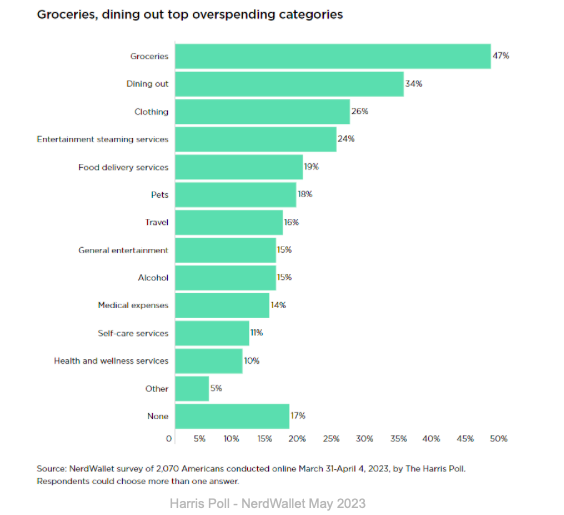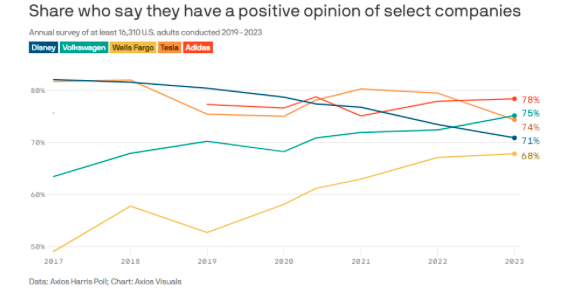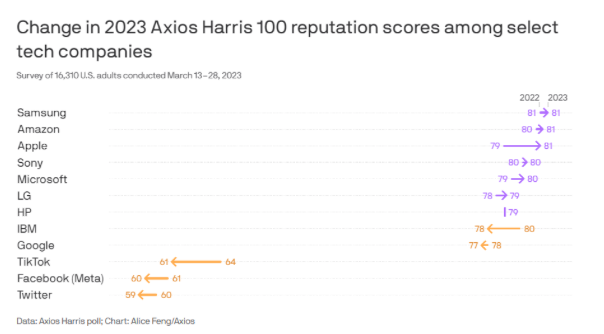Brief • 4 min Read
The latest trends in culture and society from The Harris Poll.
Try ‘budget’ on today’s Wordle because the word permeates the halls of Congress and across America’s kitchen tables. In Our America This Week survey, fielded from May 26th-28th among 2,105 Americans, concerns of a potential U.S. recession are still sky high (82%, -1%-pt v. last week), as are the ability to afford living expenses (71%, +1%-pts).
So it’s no surprise that our new May Harvard CAPS-Harris Poll (fielded May 17th to 18th among 2,004 registered voters) shows most Americans want DEMS to cut spending as the debt-ceiling bill moves to the House floor:
- More voters want Democrats to cave and negotiate on the debt ceiling to prevent a default: (57% +2%-pts from last month).
- And while (70% +6%-pts) now think default would be a considerable issue, (35% +6%-pts) say Biden has signaled a willingness to curb spending next year.
This week, we have four new data stories, including The Rise of “Corporate Therapy Speak” with Forbes, Americans are Overspending with Nerd Wallet, Bounce-Back Brands After Scandal with Axios, and the Reputational Gap in Tech That Makes Vs. Takes.
You can download the new ATW monthly summary tabs and April deck here. Have a great rest of the short week.
Enough With The Corporate “Therapy Speak”: Inc.-Harris Poll
At some point, you’ve probably heard your boss refer to your co-workers as “family.” But for workers, the practice is no longer a sign of solid company culture. According to the latest report by Harris Poll’s Thought Leadership Practice, it’s a red flag, as covered by Inc. and Forbes.
- So, what do you think about therapy speak? Therapy speak refers to empathetic-sounding language companies use to show understanding but often misses the mark or the appropriate follow-through, such as “We understand these are challenging times,” “We’re like family,” and “We’re all in this together.”
- Two-thirds of American workers (67%) say they have experienced “therapy speak” at their workplace, and of those, (34%) said that it came from a direct manager, (33%) from company leadership, and (30%) from colleagues.
- But employees are increasingly skeptical: (71%) said they see through the inauthentic communications, while a similar number (69%) called it hypocritical.
- Employees aren’t buying it: More than half (57%) of American employees responding to the survey say that therapy-speak makes them feel more resentment toward their leadership team.
Takeaway: “We’re hitting this tipping point of, ‘I’d rather you say nothing at all than say something just to say something without the action to back it up,'” Harris Poll’s Abbey Lunney. “[When] the CEO email lands incorrectly – it rubs someone the wrong way or whatever it is – it impacts people’s entire relationship with work,” Lunney says. “Employers think that they’re doing a great job…But they’re missing the mark.”
Overspending Is Easy To Do In This Economy: NerdWallet-Harris Poll
In a new Harris Poll survey with NerdWallet, overspending is becoming all too common, despite the family practice of monthly budgeting.
- Ignoring the budget: Nearly three-quarters of Americans (74%) say they have a monthly budget. However, (84%) of those with one voice they’ve gone over budget at some point.
- Bailed out by credit cards: (44%) of those who have gone over budget say they usually pay for additional purchases with plastic.
- And over eight in ten (83%) say they overspend, at least sometimes, especially on groceries (47%), dining out (34%), and clothing purchases (26%):

- Planning for future overspending: One in 5 (20%) who have exceeded their monthly budget say they’ve dipped into savings explicitly for overspending to pay for additional expenses.
Takeaway: Many marketing safety nets are flourishing, encouraging budget-busting, such as Buy Now Pay Later (BNPL), frequent flyer miles tied to credit cards, and more. And while there are expenses where many could find themselves with no choice but to overspend, such as medical costs, food when prices jump, or any number of necessities if one gets laid off or retires. That means planning for what you can control is even more critical.
Brands Bounce Back After Scandal: The Axios Harris Poll 100
Scandalized brands are slowly bouncing back, this year’s Axios Harris Poll 100 reputation rankings. And as Axios’ Eleanor Hawkins reports, no corporation, brand, or leader is immune to crises, and rebuilding trust among consumers, shareholders, and employees takes years of concerted communication campaigns.
- Catch up quickly: Major brands like Volkswagen, Wells Fargo, Adidas, Tesla, and Disney have faced many lawsuits, fines, or bad headlines following recent corporate scandals.

Axios-Harris Poll 100 Survey of Corporate Reputation March 2023
- Volkswagen was caught cheating on U.S. emissions testing in 2015 and forced to recall half a million cars and pay roughly $15 billion in settlement fees. As a result, its reputation was at an all-time low in 2016 – ranking dead last on the list – but the German automaker has since bounced back as one of the top gainers on its business trajectory, vision, and products and services.
- In 2017, Wells Fargo Bank ranked second to last in brand reputation after coming under fire the previous year after employees were caught creating fraudulent bank accounts on behalf of their customers and were subsequently fined $3 billion. Since then, the bank has seen a slow but steady increase in its reputation due to vision, culture, and business trajectory – but coming in at No. 88, it still has a long way to go.
- But regarding apologies, Americans are skeptical: Three-quarters (77%) believe most corporate apologies are insincere, and (70%) say companies rarely change their ways after being caught in controversy, a sentiment that stands across gender, age, and political leaning.
Takeaway: American consumers have come to expect scandal, but they are looking for sincerity, consistency, and action-driven messaging as part of the cleanup. Yet not all scandals have the same level of forgiveness. For example, Americans say their opinion of a company would likely recover if they were caught providing poor service (50%), partnering with a controversial figure (44%), virtue signaling (42%), running insensitive ad campaigns (42%), and passing on inflation to consumers (41%).
Americans Trust Tech Firms That Make Vs. Take: The Axios Harris Poll 100
Large tech companies crowd both ends of the rankings in this year’s Axios Harris Poll 100 brand reputation survey, with those that manufacture tangible products and valuable services clustered near the top and those that trade in social-media messages banished to the bottom details Axios’ Ryan Heath.
- What’s happening: Worries over the rise of AI, on top of long-building distrust of social media providers, have pushed the public toward these extremes.

Axios-Harris Poll 100 Survey of Corporate Reputation March 2023
- The winners: The tech companies with the highest Reputational Quotient, or RQ®, scores, were Samsung (81), Amazon (80.7), and Apple (80.6), which retained their 2022 position. Sony (79.8), Microsoft (79.7), and LG (78.8) also landed in the top 20.
- The losers: No social media platform ranked higher than 94th. Tiktok, with an RQ of 61, ranked 94th, followed by Facebook (Meta) in 97th and Twitter in 98th.In addition, all received lower RQ scores in 2023 compared to 2022.
- Meta was the company least trusted by women (only 21% gave the company a top trust rating) and the second-least trusted by Gen Z (16%), ahead of only the Trump Organization.
Takeaway: As Heath explains, people can see and sense more tangible benefits from the Apples, Amazons, and Samsungs. They employ more people because they make and sell things, and consumers can see and hold those things. In most cases, you pay them money for what they offer instead of paying in data (though sometimes it’s both).
Subscribe for more Insights
Subscribe to our newsletter for the latest trends in business, politics, culture, and more.
Download the Data
This survey was conducted online within the U.S. by The Harris Poll from May 26th to 28th among a nationally representative sample of 2,105 U.S. adults.
Download
Subscribe for more Insights
Subscribe to our newsletter for the latest trends in business, politics, culture, and more.
Download the Data
This survey was conducted online within the U.S. by The Harris Poll from May 26th to 28th among a nationally representative sample of 2,105 U.S. adults.
DownloadRelated Content








